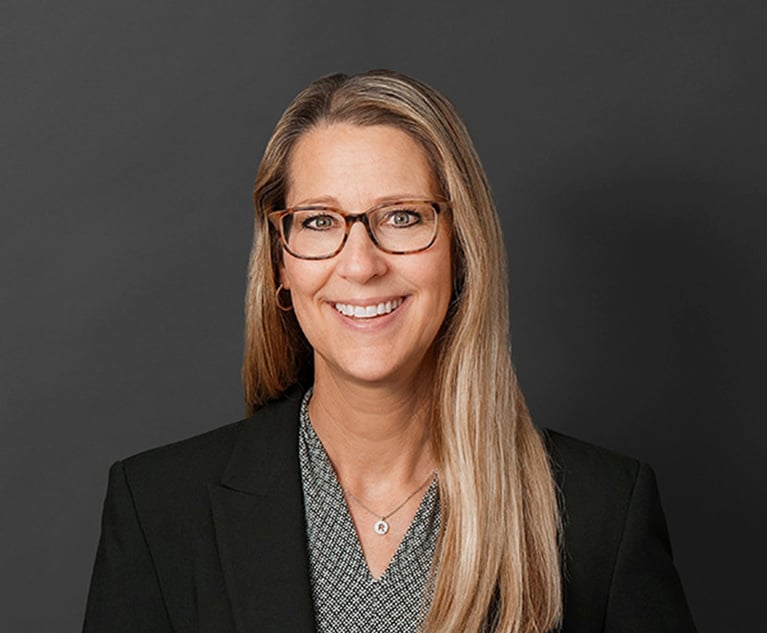Release of Report on Med Mal Venue Changes Is Delayed 1 Month
The controversial proposal is seen by many lawyers as returning the venue rules back to where they were before sweeping changes came to health insurance law in 2002.
January 02, 2020 at 01:01 PM
4 minute read
 Photo: Shutterstock
Photo: Shutterstock
The release of the Pennsylvania Senate Budget and Finance Committee's report on the closely watched issue of whether the state should change its medical malpractice venue rules has been delayed a month, but is expected to be released to the public in early February.
The committee, which had been given until Jan. 1 to submit its report to the Senate, is set to release its highly anticipated report at a public meeting of the full General Assembly on Feb. 5.
According to the Budget and Finance Committee's executive director, Patricia Berger, the committee is delaying the release so that the report can be presented to the legislature when both houses are in session, and, aside from a brief window Jan. 7, the next time both houses will be in session at the same time is in early February.
"It was a scheduling thing," Berger said, adding that the timing issue had been recognized and discussed soon after the process was adopted. "That was acceptable to the Senate leadership."
The report, Berger said, has largely been completed.
"We have the report. We're in the process of finishing the draft. Polishing it, as it were," she said.
The committee was tasked with reviewing potential impacts of the controversial medical malpractice venue rule changes in February, after the state Supreme Court agreed to hold off on considering whether to implement the changes until after an impact study could be completed.
The Supreme Court's announcement came after members of the medical industry and defense bar pushed back against the proposed changes, which seek to allow injured plaintiffs to sue in any venue where their health care provider regularly does business. The proposed changes would abandon a 16-year-old rule requiring that cases be brought in a county where treatment had been provided. As the rules stand, plaintiffs in medical malpractice cases are limited to suing in the venue where their injuries occurred.
Although many in the plaintiffs bar contended that the changes were necessary because compensation for those who suffer medical malpractice-related injuries has plummeted, the defense bar argued that the changes could lead to venue-shopping.
Any change if adopted would be a major change to the 2002 Medical Care Availability and Reduction of Errors (MCARE) Act.
In proposing the changes, the court's rules committee, which is chaired by Saltz Mongeluzzi Barrett & Bendesky attorney David Kwass, noted court statistics showing that the total number of medical malpractice cases have dropped nearly 50% from the pre-MCARE yearly average. The committee's note also said the drop has caused "a decrease of the amount of claim payments resulting in far fewer compensated victims of medical negligence."
"The current rule provides special treatment of a particular class of defendants, which no longer appears warranted," the committee said in its explanatory comment. "The proposed rescission of subdivision (a.1) is intended to restore fairness to the procedure for determining venue regardless of the type of defendant."
The changes were proposed in late December 2018 by the Supreme Court's Civil Procedural Rules Committee, and the court's announcement to postpone considering the changes came a little more than a week before the Feb. 22, 2019, deadline for submitting public comment to the committee on the issue.
The controversial proposal is seen by many lawyers as returning the venue rules back to where they were before sweeping changes came to health insurance law in 2002.
Since the rule changes were announced in December 2018, the court committee process, which typically goes unnoticed by the general public, has received an unusual amount of attention.
After significant pushback from the defense bar and medical industry—including a press conference in the Pennsylvania State Capitol with the Pennsylvania Coalition for Civil Justice Reform, state House Republican leadership and other medical groups—state Sen. Lisa Baker, R-Luzerne, who is the majority chairwoman of the Pennsylvania Senate Judiciary Committee, proposed a resolution directing the Legislative Budget and Finance Committee to analyze the potential impacts of the rule change. The proposal was adopted by the Senate on Feb. 5, 2019, by a 31-18 vote.
According to Berger, a draft of the committee's report will be sent to the committee members the week before it is released to the public, and the report will remain confidential until it is released to the full legislature in February. The document should be made available on the committee's website soon after it is released, she said.
This content has been archived. It is available through our partners, LexisNexis® and Bloomberg Law.
To view this content, please continue to their sites.
Not a Lexis Subscriber?
Subscribe Now
Not a Bloomberg Law Subscriber?
Subscribe Now
NOT FOR REPRINT
© 2025 ALM Global, LLC, All Rights Reserved. Request academic re-use from www.copyright.com. All other uses, submit a request to [email protected]. For more information visit Asset & Logo Licensing.
You Might Like
View All


Penn State Dickinson Law Dean Named President-Elect of Association of American Law Schools
Trending Stories
Who Got The Work
J. Brugh Lower of Gibbons has entered an appearance for industrial equipment supplier Devco Corporation in a pending trademark infringement lawsuit. The suit, accusing the defendant of selling knock-off Graco products, was filed Dec. 18 in New Jersey District Court by Rivkin Radler on behalf of Graco Inc. and Graco Minnesota. The case, assigned to U.S. District Judge Zahid N. Quraishi, is 3:24-cv-11294, Graco Inc. et al v. Devco Corporation.
Who Got The Work
Rebecca Maller-Stein and Kent A. Yalowitz of Arnold & Porter Kaye Scholer have entered their appearances for Hanaco Venture Capital and its executives, Lior Prosor and David Frankel, in a pending securities lawsuit. The action, filed on Dec. 24 in New York Southern District Court by Zell, Aron & Co. on behalf of Goldeneye Advisors, accuses the defendants of negligently and fraudulently managing the plaintiff's $1 million investment. The case, assigned to U.S. District Judge Vernon S. Broderick, is 1:24-cv-09918, Goldeneye Advisors, LLC v. Hanaco Venture Capital, Ltd. et al.
Who Got The Work
Attorneys from A&O Shearman has stepped in as defense counsel for Toronto-Dominion Bank and other defendants in a pending securities class action. The suit, filed Dec. 11 in New York Southern District Court by Bleichmar Fonti & Auld, accuses the defendants of concealing the bank's 'pervasive' deficiencies in regards to its compliance with the Bank Secrecy Act and the quality of its anti-money laundering controls. The case, assigned to U.S. District Judge Arun Subramanian, is 1:24-cv-09445, Gonzalez v. The Toronto-Dominion Bank et al.
Who Got The Work
Crown Castle International, a Pennsylvania company providing shared communications infrastructure, has turned to Luke D. Wolf of Gordon Rees Scully Mansukhani to fend off a pending breach-of-contract lawsuit. The court action, filed Nov. 25 in Michigan Eastern District Court by Hooper Hathaway PC on behalf of The Town Residences LLC, accuses Crown Castle of failing to transfer approximately $30,000 in utility payments from T-Mobile in breach of a roof-top lease and assignment agreement. The case, assigned to U.S. District Judge Susan K. Declercq, is 2:24-cv-13131, The Town Residences LLC v. T-Mobile US, Inc. et al.
Who Got The Work
Wilfred P. Coronato and Daniel M. Schwartz of McCarter & English have stepped in as defense counsel to Electrolux Home Products Inc. in a pending product liability lawsuit. The court action, filed Nov. 26 in New York Eastern District Court by Poulos Lopiccolo PC and Nagel Rice LLP on behalf of David Stern, alleges that the defendant's refrigerators’ drawers and shelving repeatedly break and fall apart within months after purchase. The case, assigned to U.S. District Judge Joan M. Azrack, is 2:24-cv-08204, Stern v. Electrolux Home Products, Inc.
Featured Firms
Law Offices of Gary Martin Hays & Associates, P.C.
(470) 294-1674
Law Offices of Mark E. Salomone
(857) 444-6468
Smith & Hassler
(713) 739-1250






